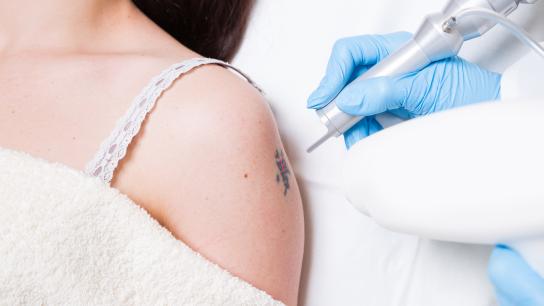
You don't have to have the name of your ex, a gang sign or some unrecognizable or embarrassing picture prominently displayed somewhere on your bod to regret that tattoo. Besides having moved on in life, there are numerous other reasons you might want it gone for good. Maybe it's keeping you from getting that promotion at work, it's just not "you" anymore, or you don't like the example it sets for your kids. Maybe it's just ugly as sin because you obtained it in a drunken haze during your collegiate years.
In researching this story, I googled worst tattoos and was hit with images that are either hideous, ridiculous, inappropriate or such poor examples of art that it is crystal clear why tattoo remorse is a very real thing. Luckily, doctors are usually able to remove them. There are many methods of removal, including surgical excision and dermabrasion, but of all the ways to ditch that ink, laser tattoo removal has really cut to the head of the line. Certain factors like whether the tattoo was professionally done or a home-grown version and the location of your unwanted ink will play a role in determining what method of removal is the right choice for you. Board-certified, Beverly Hills-based plastic surgeon, Dr. Sheila Nazarian says, "Laser tattoo removal is the gold standard." Specific lasers are used to break down the ink particles in the tattoo, which are then absorbed and eventually eliminated by the body, and depending on the different variables of your tattoo situation more than one type of laser might be required to get the job done.
Even though laser tattoo removal is the preferred choice, it's not without its downsides, potential side effects and possible risks. It can be mildly to majorly uncomfortable, time consuming because it will most likely have to be spaced out over a period of a few months, and costly because the number of treatments needed can quickly add up. Dr. Nazarian points out, "Blistering and scabbing is common after each laser treatment and antibiotic ointment should be applied." This will reduce the risk of infection and possible scarring. She says that hyperpigmentation and hypopigmentation are possible risks as well but "hyperpigmentation can be lessened with strict sun avoidance and hypopigmentation usually resolves with time."
It's required to have a licensed physician on site when undergoing prescription laser removal treatments but since each state dictates who can or can't operate the laser, your treatment might not be administered by a doctor. That said, Dr. Nazarian believes that "doctor oversight is a must," and stresses the importance of having "someone with wound care experience and laser experience performing the treatment."
The takeaway here is: If you're going to get a tattoo, choose wisely and do your best to pick one that will stand the test of time. If you want to get one removed now, make sure you are in very experienced hands to decrease your chances of any complications. Tattoo removal has a 90% patient satisfaction rating. To learn more about the procedure, and read patient reviews, visit the procedure page.
Click here to find a board certified doctor in your area who has experience performing tattoo removal.





